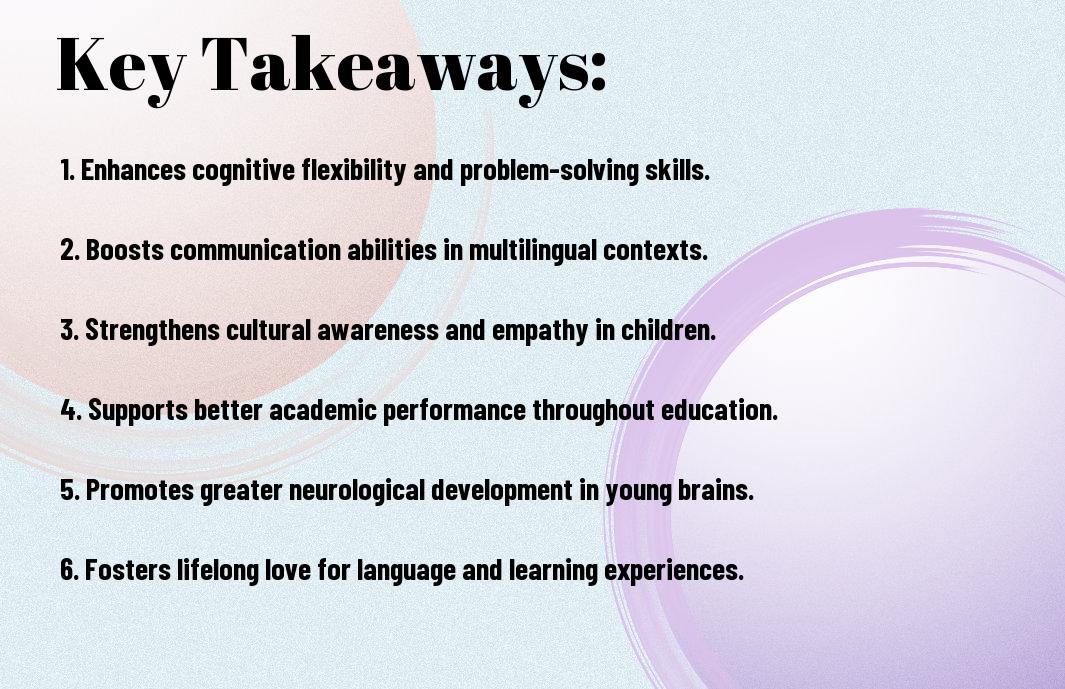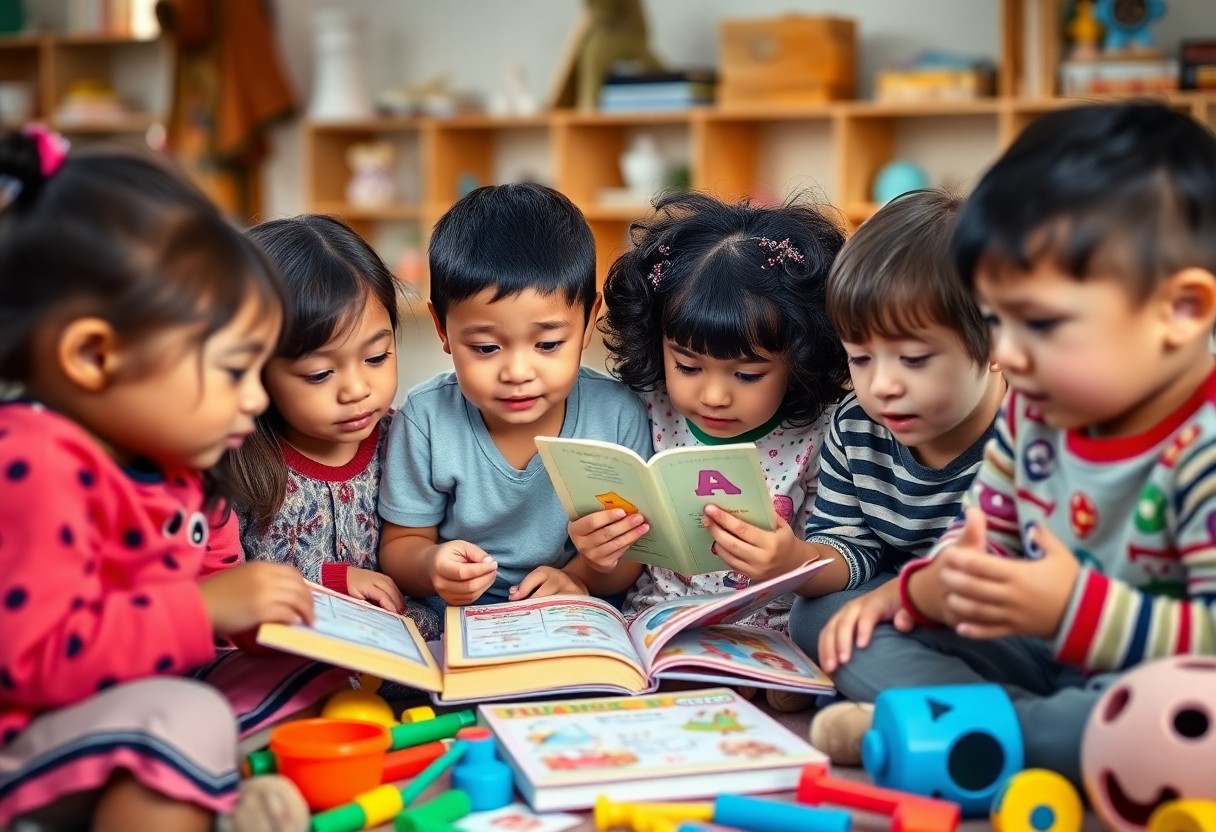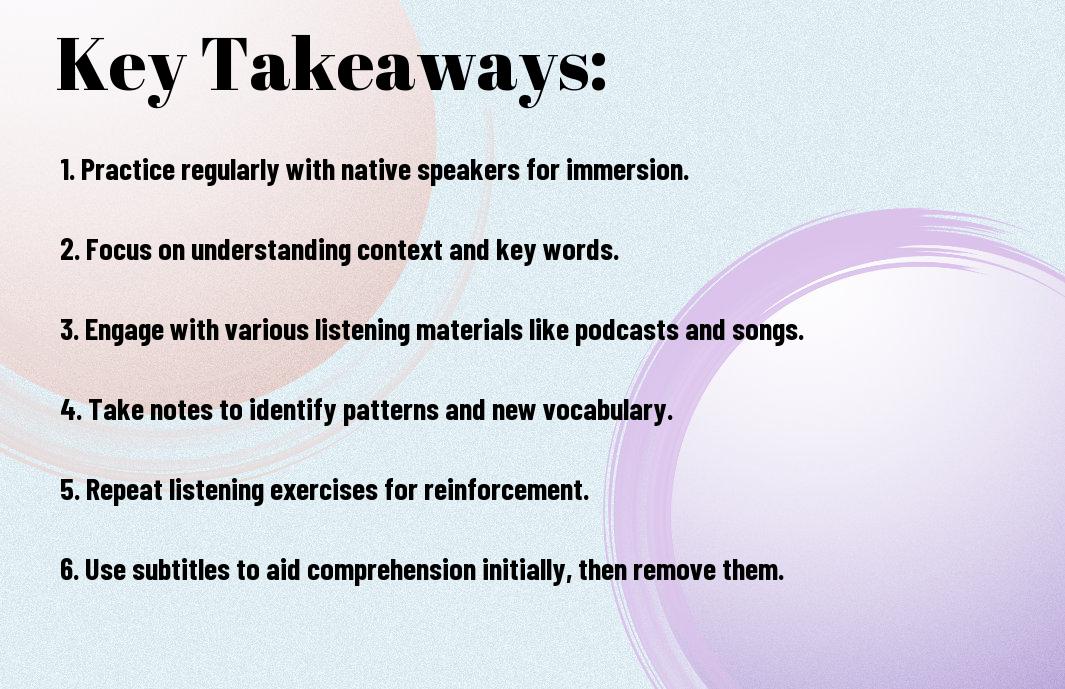As you consider the best ways to support your child’s early development, you may be wondering about the benefits of bilingualism. You can give your child a significant advantage by introducing two languages from an early age. Your child’s brain is wired to absorb and process multiple languages, and doing so can have a lasting impact on their cognitive, social, and emotional growth. By raising a bilingual child, you can broaden their cultural understanding and open up new opportunities for their future.
Key Takeaways:
- The brain development of bilingual children is enhanced, as it improves cognitive flexibility and problem-solving skills from an early age, setting them up for future academic success.
- Bilingual children have an academic advantage, as they tend to perform better in reading and mathematics, and have a broader vocabulary range compared to their monolingual peers.
- Language skills are developed at a rapid pace in early childhood, and bilingual children are able to pick up phonological awareness and grammatical structures more easily, making them more proficient in both languages.
- Bilingualism in early childhood also promotes social benefits, such as greater empathy and cultural understanding, as children are exposed to different customs and traditions from a young age.
- The long-term effects of bilingualism in early childhood development are numerous, including improved career opportunities and a stronger sense of identity, making it a valuable investment for children’s future personal and professional lives.
Benefits of Bilingualism
The ability to speak multiple languages from a young age has numerous benefits for your child’s development, including improved cognitive skills and enhanced social interactions. As you explore the advantages of bilingualism, you’ll discover how it can shape your child’s future.
Cognitive Advantages
For instance, being bilingual can improve your child’s problem-solving skills and memory, allowing them to approach challenges from different perspectives and adapt to new situations more easily. You’ll notice your child’s brain developing in unique ways as they navigate multiple languages.
Social and Cultural Benefits
At the heart of bilingualism lies a profound impact on your child’s social and cultural development, enabling them to connect with diverse communities and foster deeper understanding and empathy. You’ll find that your child’s bilingual abilities open doors to new relationships and experiences.
It is worth noting that the social and cultural benefits of bilingualism extend beyond language itself, influencing your child’s identity, values, and worldview. As you support your child’s bilingual journey, you’ll witness them developing a more nuanced and accepting outlook on life, preparing them to thrive in an increasingly globalized world.

Language Development in Early Childhood
Now, as you explore the world of bilingualism in early childhood, you’ll discover the significant impact it has on language development. Your child’s brain is wired to absorb and process multiple languages, setting the stage for a lifelong journey of linguistic exploration.
Language Acquisition Process
Beside the complexities of language, you’ll find that your child’s language acquisition process is shaped by their environment and interactions. Your role as a parent or caregiver is to provide a nurturing space for language growth, allowing your child to develop their skills at their own pace.
Factors Influencing Language Development
During development, several factors influence your child’s language development, including:
- Genetics
- Environment
- Culture
. Recognizing these factors will help you better support your child’s language journey.
Hence, as you investigate deeper into the factors influencing language development, you’ll notice that your child’s linguistic growth is shaped by a combination of genetic and environmental factors. You can consider the following:
- Exposure to multiple languages
- Quality of interactions
- Socioeconomic status
. Recognizing the interplay between these factors will enable you to create a supportive environment for your child’s language development.
The Impact of Bilingualism on Brain Development
After discovering the benefits of bilingualism, you may wonder how it affects your child’s brain development. Bilingualism has a significant impact on the brain, shaping its structure and function in unique ways. As you introduce your child to multiple languages, their brain adapts and changes, leading to enhanced cognitive abilities.
Neuroplasticity and Language
About the time your child starts learning a second language, their brain begins to reorganize and refine its neural connections. This process, known as neuroplasticity, allows your child’s brain to adapt and change in response to new language experiences.
Enhanced Cognitive Flexibility
At this stage, you may notice your child developing enhanced cognitive flexibility, which enables them to switch between languages and tasks with ease. As your child navigates multiple languages, their brain becomes more efficient at processing and switching between different mental sets.
Brain function is significantly improved when your child is bilingual, and this is evident in their ability to focus, problem-solve, and multitask. You will observe that your child can seamlessly switch between languages, demonstrating an impressive level of cognitive flexibility. This ability to adapt to new situations and think creatively will serve your child well throughout their life, opening up new opportunities and experiences for them to explore.
Parental Involvement and Support
All parents play a significant role in their child’s bilingual development, and you can support this process by learning about the benefits of bilingualism, such as those outlined in Advantages of a bilingual brain – Child & Family Development.
Creating a Bilingual Environment
Bilingually, you can create an environment that fosters language development by speaking to your child in both languages and providing them with bilingual resources and activities.
Encouraging Language Use
Creating opportunities for your child to practice both languages is vital, and you can do this by setting aside time to speak with them in each language, reading bilingual books, and engaging in activities that promote language use.
Hence, as you encourage your child to use both languages, you will notice their confidence and proficiency grow, and you can support this growth by responding to them in the language they use, thus creating a positive and encouraging environment for bilingual development. You can also engage in conversations with your child, ask them questions, and listen to their responses to promote language use and development. By doing so, you will be helping your child to develop a strong foundation in both languages and setting them up for success in their future academic and professional pursuits.

Overcoming Challenges and Common Misconceptions
To successfully raise a bilingual child, you need to be aware of the potential challenges that may arise and address common misconceptions about bilingualism in early childhood development.
Addressing Language Delay Concerns
Besides the benefits of bilingualism, you may have concerns about language delay, but research shows that bilingual children can overcome this and develop language skills at a similar rate to monolingual children.
Debunking Myths about Bilingualism
With the increasing popularity of bilingualism, you will encounter various myths and misconceptions, and it’s imperative to separate fact from fiction to make informed decisions about your child’s language development.
But as you examine deeper into the world of bilingualism, you will discover that many of these myths are unfounded, and that bilingual children can thrive in multiple languages, developing a unique set of cognitive and social skills that will benefit them throughout their lives, and you can take pride in providing your child with the gift of bilingualism, enriching their future opportunities and broadening their cultural understanding.
Implementing Bilingual Education
Not only is bilingualism beneficial for children, but it can also be effectively implemented in early childhood education. You can learn more about the benefits of bilingualism by visiting Bilingualism in the Early Years: What the Science Says.
Curriculum Design and Implementation
Beneath the surface of a well-structured bilingual program lies a thoughtful curriculum design. You will need to consider how to balance languages and allocate time for each language in your daily schedule.
Teacher Training and Support
Once you have designed your curriculum, you will need to ensure your teachers are equipped to deliver it effectively. You should provide your teachers with training and support to help them develop the skills they need to teach bilingual classes.
And as you probe deeper into teacher training and support, you will find that it is vital to provide ongoing professional development opportunities for your teachers. You can do this by offering workshops, mentoring programs, and coaching sessions that focus on bilingual education best practices, language development, and cultural sensitivity. By investing in your teachers’ professional growth, you can ensure that your bilingual program is successful and that your students receive the high-quality education they deserve.
To wrap up
Following this exploration of bilingualism in early childhood development, you now understand the significant benefits it brings to your child’s cognitive and social growth. As you consider introducing a second language to your child, you can expect enhanced problem-solving skills and a broader cultural perspective. By embracing bilingualism, you are investing in your child’s future, providing them with a valuable skill that will last a lifetime and open doors to new opportunities. Your decision will have a lasting impact on your child’s development.
FAQ
Q: What are the cognitive benefits of bilingualism in early childhood development?
A: The power of bilingualism in early childhood development has been shown to have a significant impact on cognitive abilities. Bilingual children tend to develop enhanced executive function, which includes skills such as problem-solving, planning, and decision-making. Additionally, bilingualism has been linked to delayed onset of age-related cognitive decline and a lower risk of dementia. This is because bilingual children’s brains are constantly switching between two languages, which exercises their cognitive flexibility and adaptability.
Q: How does bilingualism affect language development in young children?
A: Bilingualism can have a profoundly positive effect on language development in young children. When exposed to two languages from an early age, children can develop native-like fluency in both languages, with the ability to understand and communicate effectively in each. Moreover, bilingual children often develop a greater awareness of language structures and rules, which can aid in their overall language development and literacy skills. It’s also worth noting that bilingual children may experience a slight delay in vocabulary development, but this is usually temporary and catches up by around the age of 5.
Q: Can introducing a second language at a young age confuse a child or hinder their ability to learn their native language?
A: No, introducing a second language at a young age will not confuse a child or hinder their ability to learn their native language. In fact, the opposite is true: when done properly, bilingual education can enrich a child’s understanding of both languages. Children as young as infants can differentiate between two languages and begin to develop an understanding of the distinct grammar, vocabulary, and pronunciation of each. With consistent exposure and support, bilingual children can thrive in both languages, leading to a lifetime of linguistic and cultural benefits.







